Spam is taking over Google My Business, damaging rule-abiding local businesses’ chances of appearing in the local pack due to spammers gaming the system.
This epidemic of fake listings, keyword-stuffed business names, and falsified reviews affects local businesses everywhere, and it’s up to local marketers to set businesses straight.
In our ‘How to Fight Spam and Influence Rankings’ webinar, Myles was joined by Sterling Sky‘s Joy Hawkins, Steady Demand‘s Ben Fisher, and Over The Top Marketing‘s Jason Brown. If you missed it, the webinar recording is available to watch below. We’ve also written up a summary of our favorite insights.
Note: In February 2019 Google announced they were retiring the Spam & Policy forum, and releasing a new way to report GMB spam. Read more on this here.
Contents
Video – How to Fight Spam and Influence Rankings
What is Google My Business spam?
Jason Brown explains, “GMB spam is any business that is adding their keywords into their business name, or using a fictitious address or inflating their listing with fake reviews. Spam is anything that goes against Google’s TOS to influence rankings, and dominate over your competitors.”
Ben Fisher said, “Spam is about inauthenticity. In the normal course of business, if a business is doing well from a reputation standpoint, they won’t need to buy a bunch of fake 5-star reviews, for example. If they’re doing well from an SEO standpoint, they’re going to be rewarded and rank higher. They don’t need to stuff their name with keywords to rank higher. Then there’s location spam, where you’re faking an address (which is illegal in some cases). It all comes down to inauthenticity.”
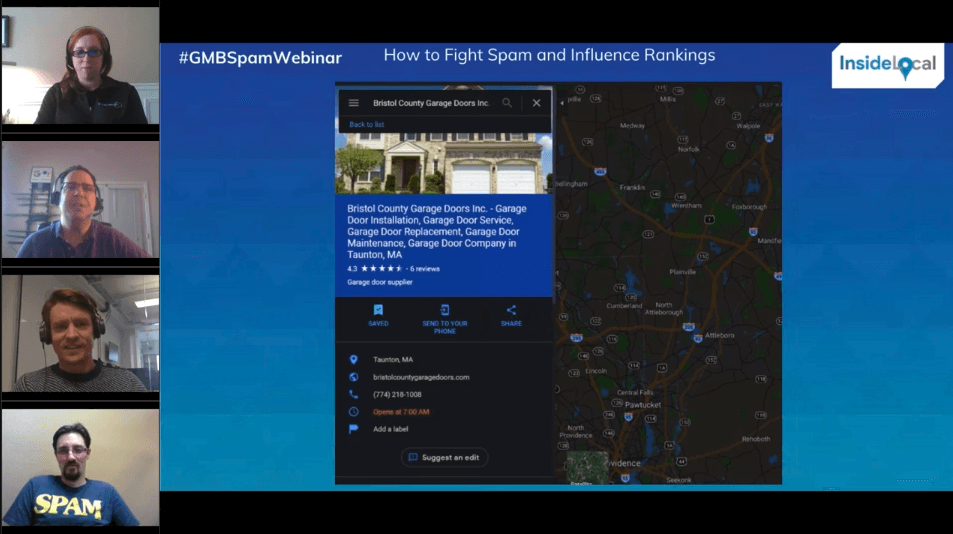
Joy Hawkins explained her experiences with spam: “We’re seeing a trend of spam that has negative intentions. This is either inflating your own rankings, or majorly harming the rankings of a competitor through fake negative reviews or photo spam.”
Joy discussed her role on the Google product forums, “One of the huge advantages to being a forum product tester, is seeing case after case of how Google responds to different things. Some stuff that I know off the top of my head about Google policies seems to be foreign to many people, and I think that comes as a side effect of so many cases shared with Google. It becomes clear what they do and don’t enforce, which is great knowledge to have.”
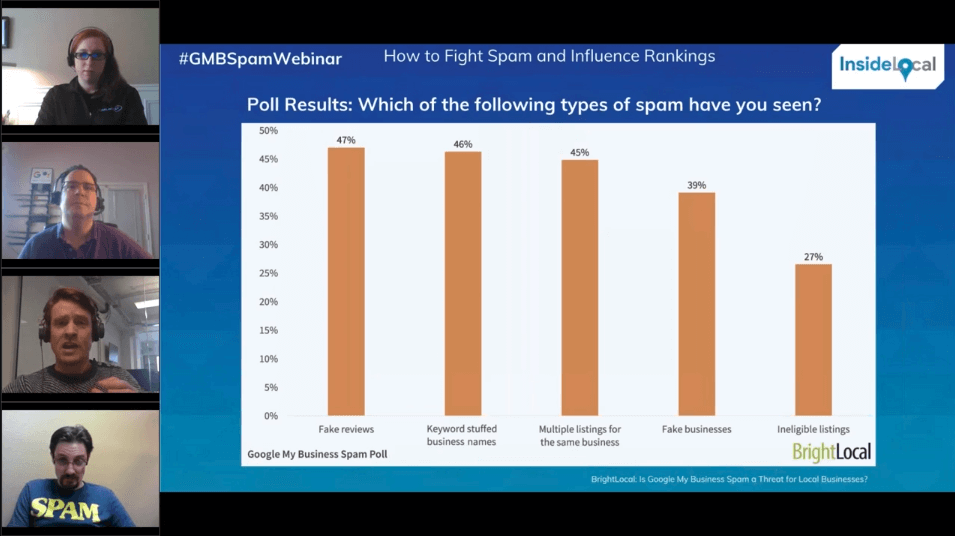
Why is Google My Business spam a big problem?
Jason shared his view on why spam is concerning for local marketers. “Everyone is looking for ways to cut corners. Unfortunately, it’s so easy to create a fake listing, keyword stuff it, and buy a bunch of fake reviews. The reason it’s such a big problem is because it’s so easy to do.” He continued, “Google has their hands full with phone spammers, and all the fake ads online. There’s nobody to really police it, which is why Google is relying on consumers and volunteers to come in and play the police game.”
“I have to agree with Jason there,” said Ben. “It’s a very low-risk, high-reward tactic, especially in some industries. Currently, the possibility of getting your listings shutdown or suspended is pretty low, though it is happening more often now.”
Joy agreed, “Some marketing companies create fake listings for their clients, with no harm to their clients. Even if the account gets suspended, it’s their account, not the business’s account. I think until there are actual penalties for this type of stuff, it’s going to continue to be like the Wild West, like it was with links before Penguin.”
Myles asked why Google isn’t doing more to tackle spam. Joy said, “I think Google is tackling stuff that hurts consumers directly. While I do argue that this hurts consumers, it’s not as bad as having a criminal come into your house because you hired them as a locksmith from Google. They’re cracking down in certain industries, but I don’t feel like they care as much about cases where it’s harming businesses rather than consumers. At the end of the day, if I call a lawyer because I found a fake lead gen listing that eventually got me to a lawyer, I still got what I was looking for as a consumer, so it’s not as big of an issue to Google.”
Ben followed, “Because we’re in the industry and look at this every day as SEOs, we feel that this is a huge issue. In reality, I think they when Google looks at the number of listings that are spammy or fake in nature, the percentage amount is so small, that it’s not a big problem for them.”
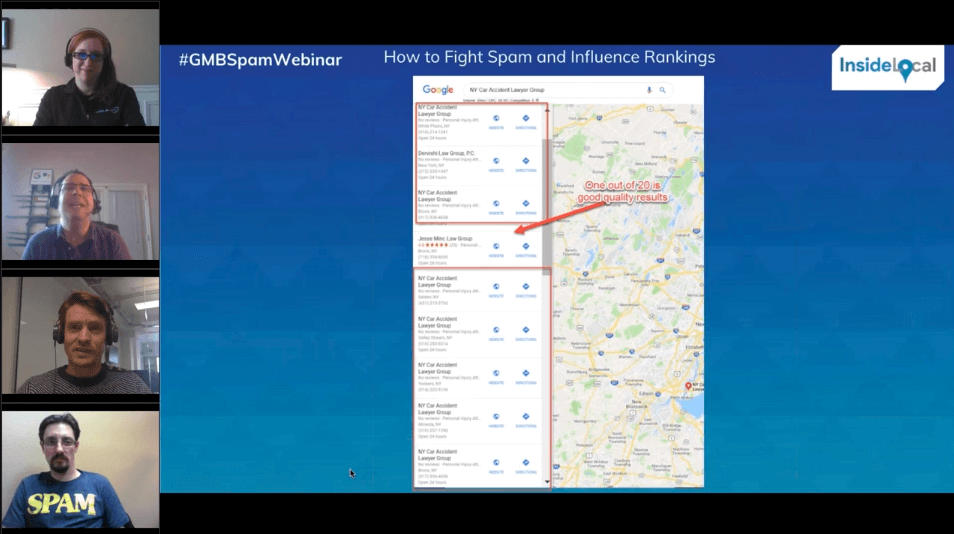
Joy talked through the testing she is currently doing around name spam. “It’s something we’re currently testing on lots of different listings. We found consistently that adding keywords to the business name will increase the ranking overnight. I think that’s why it will continue to be a problem, it’s so fast and easy. You don’t need to know anything about SEO to get results if this is your strategy, you just won’t keep the client for very long!”
Ben then shared a spam-fighting tip, “When we see examples in the forums where people are stuffing their domain name, for example, and it doesn’t even match on their website, report them. Even though you’re reporting the name spam, Google will look into the efficacy of that business and see if it’s a real location. If it’s not, they will remove them from Maps.”
What do Google Product Experts do?
The panel went on to discuss their roles on the GMB Forum. Ben explained, “You can think of our role as the last line of defense. If a user comes in with a problem, the first thing we’ll say is, have you followed protocol? That is, have you flagged the review, waited three days, contacted Google support by phone, social media, or chat? If they come back and say no, then we’ll tell them to do that, then come back with a case ID if you still have a problem.”
Jason continued, “We make sure best practices are being followed. If we see something that looks suspicious in nature, that’s when we’ll go in and ask Google to take a look.”
What impact does GMB spam have on local search results?
Discussing the impact of spam, Joy explained, “It really depends on the industry. If you’re a restaurant, you probably won’t be fighting spam much, whereas lawyers will have to fight spam like crazy. For businesses in high-spam industries, we spend a good amount of time trying to get rid of spam in results. It has a good positive impact because if you’re third, and the person in second isn’t even supposed to be there, if you get rid of them you instantly move up one. If you approach it this way, it’s a high impact type of work.”
“The impact of spam on results depends on the industry. Industries where you don’t actually have to *meet* people at the office, such as lawyers and insurance agents, are much easier to conduct GMB spam for, compared to, say, a restaurant.” – @joyannehawkins #GMBSpamWebinar
— BrightLocal (@bright_local) February 13, 2019
Myles asked why there are different amounts of spam across industries. Joy explained, “It all depends on whether the user has to show up. I couldn’t make a fake restaurant and actually conduct business, because people would have to show up. If I’m an insurance company, I can go to the user, or do transactions over the phone, or meet people. Those are the industries where you see the spam because the location doesn’t really matter, they only want to rank to get the lead.”
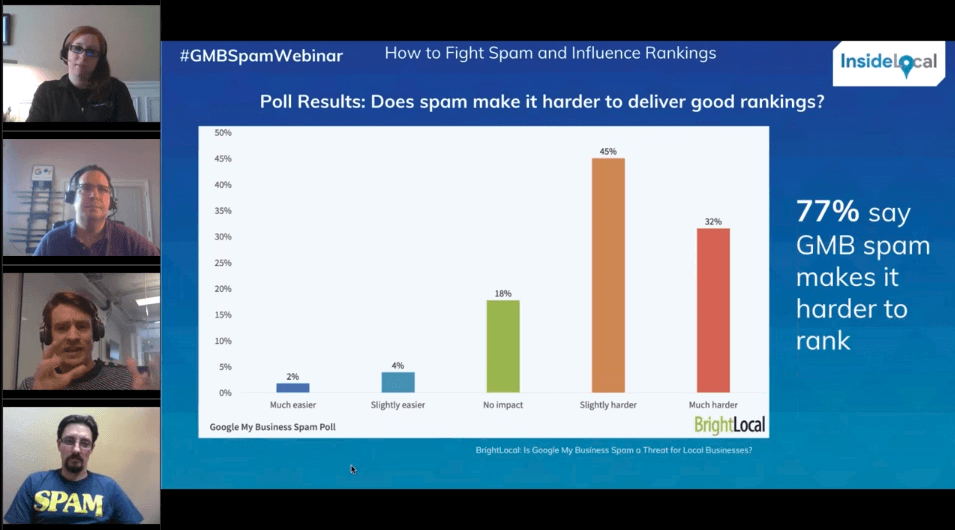
Myles shared the findings of a recent BrightLocal poll, where 77% of respondents told us that GMB spam makes it more difficult for local businesses to rank.
Jason agreed with the findings, “I can find a spam listing within five minutes. A reporter sent me a business’s GMB listing to ask if they were doing something with their reviews, and within two minutes I’d found three fake reviews. It’s definitely prevalent in a lot of different areas and verticals.”
Myles said, “It’s a tough sell, isn’t it? As an SEO working with local businesses, it can be hard to convince them to play it by the book.” Jason agreed, “It is, when their competitors are doing what we tell them not to do, some businesses sit there and say they’re going to do it anyway.”
Ben shared an interesting example: “Some lawyers have even gone as far as changing their name on the state bar. It’s not a great long-term strategy, and I’d never suggest to my clients to rename their business just to get ranking! If there’s one thing we know about Google, eventually they will catch up. You might have a short-term gain, but a long-term loss.”
Joy disagreed, “I think it’s a genius strategy, and I would do it if I was in their shoes. I don’t think there’s anything spammy about renaming your business to include keywords if it’s not a lot of effort. For some business types they’d have to redo all their signs and it’d be very expensive. But depending on the scenario and how much work is involved, I see it as a very smart business strategy.”
Which tactics are effective for cleaning up listing spam?
Joy shared the guidelines for reporting spam on the Google My Business forum and recommended following these step-by-step when reporting a problem. “People leave off the ‘Why’ all the time when telling us something is fake, and we ask how they concluded that. You have to know what Google accepts as evidence. You can’t link to Facebook or Yelp to show that’s how the business is listed is there, Google won’t accept that, they’ll only accept a government document or professional association or the BBB.”
The panel went on to discuss the impact of making suggested edits in GMB. Joy said, “I think it works less and less. It used to work a lot better when Mapmaker was around because peers could review your edits, but we’re seeing suggested edits being less useful in most cases. Google’s turnaround time is about 3-4 months, we’ve been finding.”
?Maps edits can take a LONG time to get reviewed so I tend to send spam over to Google through their support channels (Twitter/Facebook GMB Forum) ASAP after discovering the spam. – @ColanNielsen #GMBSpamWebinar #LocalSEO @bright_local
— Andy Simpson ? (@ndyjsimpson) February 13, 2019
“Think about it as quality over quantity,” says Ben. “If you’re constantly submitting information that isn’t correct, Google obviously knows this. If you’re getting constantly rejected, the authority of your profile has gone way down – you’re not a Level 8, you’re a Level 0.”
Joy agreed, “I see spam like a zombie, it constantly comes back from the dead. I constantly worked on one listing for almost a year, it would get taken down and then come back, until it finally got taken down on the third or fourth time. A couple of weeks ago I checked, and the business owner has created a new listing with another address that isn’t eligible. This guy is never going to stop until he gets a listing in the city, even though his office is in the suburbs. I know it’s going to be a constant battle, he’ll pop up a new business and I’ll knock it down. It’s like whack-a-mole.”
How do you report GMB spam?
You can only report spam via the Google My Business Forums, Twitter, and Facebook. Joy warned not to report spam through phone or chat support, as they won’t talk to you about anything unrelated to your own business. Ben recommended focusing on one channel, rather than confusing matters by reporting across all of them.
Ben explained the differences with the social support channels: “They are going to tell you immediately, ‘Thank you, we’ll escalate this to our back end team. But, we are not going to be able to tell you anything about the results because you don’t own the account.’ So this will have to be something you’re going to have to monitor by yourself.” However, on the forum, you’ll receive a response.
Joy shared a tip for using the forums, “The only negative to the forum is that there are a limited number of volunteers to moderate it, and an insane amount of threads. I personally get irritated with people tagging me in threads, I have a business to run and do this in my spare time.”
“If you have my permission to tag me that’s fine, but otherwise don’t do it,” said Ben.
“Product Experts are not Googlers, and it’s not our product. I wish I could remove all the spam for you at the click of the bottom, but I can’t,” says Joy.
For a step-by-step guide to reporting spam, read Sterling Sky’s ‘Ultimate Guide to Fighting Spam on Google Maps‘.
How is spam punished?
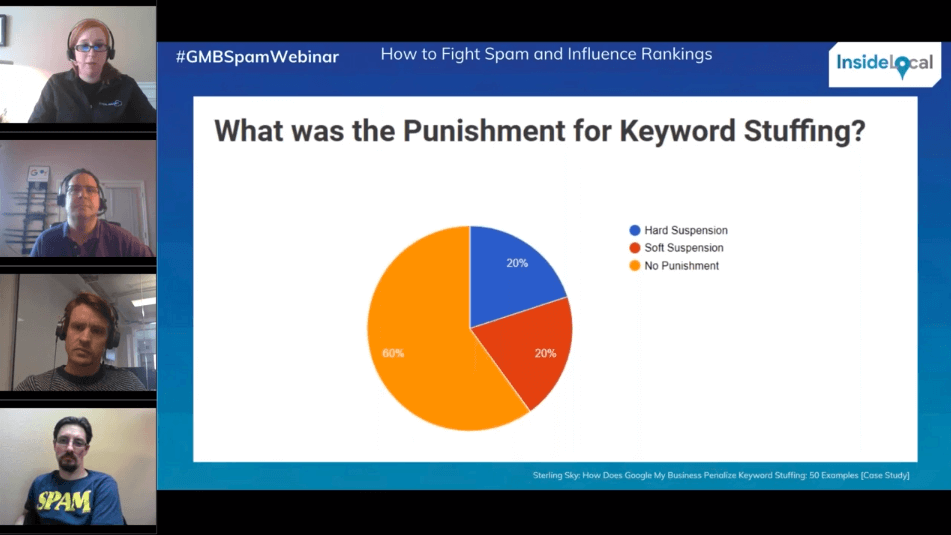
The panel went on to discuss a case study written by Sterling Sky, ‘How Does Google My Business Penalize Keyword Stuffing‘, that explores how many times listings got reinstated before disappearing.
Jason discussed Google My Business and franchises. “We had one case where Google emailed all the users associated with a couple of listings that warned against illegal activity. In another example, a Google employee told me that adding a certain user to the account would cause the listing to get suspended. Google’s fully aware of who’s involved in doing well. We’re always preaching for people to do the right thing, as what you’re doing for your listing could have negative impacts for everyone involved.
Should SEOs offer spam fighting to clients?
Ben discussed his spam fighting offering. “We offer it as a stand-alone service. I know of many agencies that won’t even include it as a line-item, it is just part of their retainer. I think every agency that works in the local space should be doing spam fighting of one kind or another.”
Myles summarized the thoughts of the panel, “Incorporating spam fighting into the tactics that you use should be something that most agencies are doing, particularly if they’re working with industries where spam is prevalent. This is something they should be factoring into their playbook now in terms of what’s going to impact their customers’ positioning. It’s about how they pitch this in an overt way as a line-item, or if it’s just one of the tactics they operate under.” He then shared further stats from a recent BrightLocal poll on spam fighting.
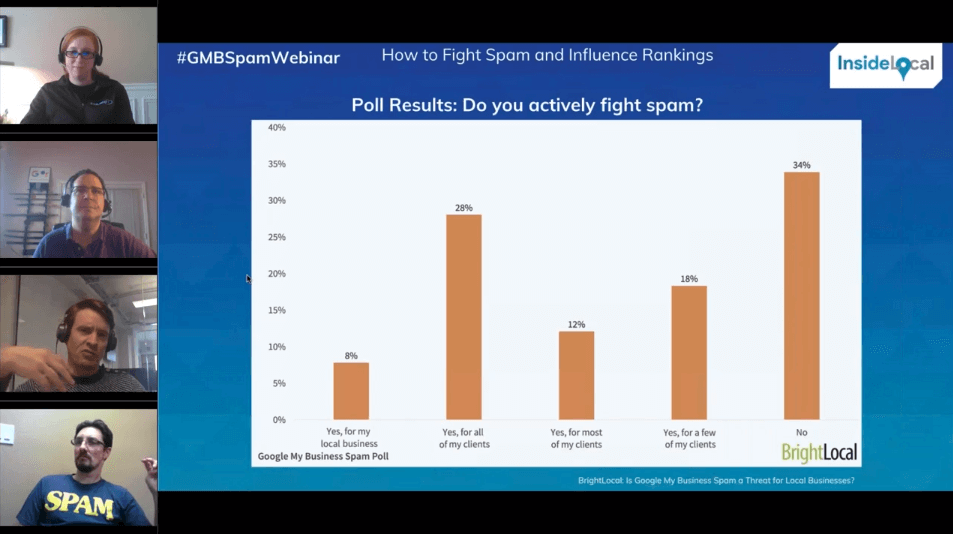
How will Google tackle spam in 2019-20?
Jason said, “Google’s not going to sort it out, they’ve made it abundantly clear that this is a free service, so why would they invest lots of time and resources into battling this. I tell people, it’s not going to change until Google is forced to change.”
Ben followed, “More than likely we’ll see some things in the next 12-24 months that Google is doing to tackle some aspects of spam. These probably won’t be visible to the average user. Right now, spam problem is such a small percentage of GMB. The more that we as the local SEO community prove that this is actually problem, the more Google will take a step up and take a harder look at it. As the local SEO community, it’s part of our responsibility, for both our clients and the entire ecosystem, to show exactly how much of a problem it is.”
Joy added, “I think Google will make some steps in the next two years to try and tackle spam, but I think they’ll always be five steps behind the spammers. They’re very behind whatever tactics spammers are using, and I think this gap is growing rather than shrinking.”
Useful Resources
- Google My Business Forums
- Google My Business Twitter
- Google My Business Facebook
- GMB Forum: How to Properly Report Spam on the Google My Business Forum
- Sterling Sky: How Does Google My Business Penalize Keyword Stuffing: 50 Examples [Case Study]
- Sterling Sky: The Ultimate Guide to Fighting Spam on Google Maps
- Local Search Forum: 4-Star Fake Review Issue – Over 2.3 Million Fake Ratings on Google
- BrightLocal: Poll Results – Is Google My Business Spam a Threat for Local Businesses?
- BrightLocal: How Can Local Businesses Fight Spam in Local Results?
Q&A
Below are some of the highlights from the live Q&A. Thank you to Sterling Sky’s Colan Nielsen and BrightLocal’s Matt Coghlan for their answers below. You can follow Colan on Twitter here.
Q. Is it considered spam if adding 1 keyword on the business name. Business is legit, has physical address and unique phone. For example “Rose Apartments in Austin”. Actual business name is Rose Apartments.
A. “According to the GMB guidelines this is considered spam. With that said, simply adding the city name is a minor offense and Google rarely penalizes for doing so.” – Colan Nielsen
Q. Since most of the spam GMB sites seem to be service-based businesses, with the address not listed, are you also seeing spam locations with their address published?
A. “Yes, all the time. The most common examples are listings listed at virtual offices.” – Colan Nielsen
Q. Do you feel that Real Estate agents with a GMB listing, using a cell phone number but use the broker address is spammy?
A. “If the broker’s official business address isn’t his home and he’s using his home address because of it has a more central location over the official office – then this is spam. I wouldn’t say the cell phone number is spam as there’s no SEO benefit to using a cell phone number.” – Matt Coghlan
Q. If I see a competitor adding KWs to their business name that aren’t in their official business title, what is the best way to report them and will they be notified that I was the person who reported them? I don’t want companies to see that I have reported them for abusing the guidelines and then come after our company.
A. “The best way to report them is to send a DM to the GMB Social Team on Twitter @GoogleMyBiz. And no, there is no way that the company can see WHO reported them.” – Colan Nielsen
Q. How much attention is Google paying to review gating now? Is it grounds for account suspension?
A. “Google is paying attention to this but it doesn’t seem to be on a proactive basis. If you report a company who is review gating, Google may remove a chunk of their reviews. But they will not suspend a listing for review gating.” – Colan Nielsen
Q. When we report spam, how long should we wait before we escalate the issue?
A. “Maps edits can take a LONG time to get reviewed so I tend to send spam over to Google through their support channels ASAP after discovering the spam.” – Colan Nielsen
Q. Should a business listing on GMB correspond with what’s filed with the State Corporation Commission?
A. “More importantly the name on GMB should reflect the “real world” business name. So make it match the signage and business website.” – Colan Nielsen
Q. How can I identify identity spam? Is it from the name? What other things can we look for for backup? Maybe the website?
A. “Look at the website as well as streetview to look for signage. Check the Sec. of State for the business license.” – Colan Nielsen
Q. How should a home biz do a GMB if you can’t use your home address?
A. If the home address is the official address you need to use that for GMB. The only alternative that can work is using the address of a partner in the business.
Q. How can a business fight event spam (generated through schema markup) that is pulled into the knowledge panel?
A. Google provides an option to report schema spam through this page https://support.google.com/webmasters/contact/rich_snippets_spam?hl=en. Any reviews that look fake on Google My Business should be reported via Google from the review directly, here’s a good post which looks at the best approach for this https://www.evoluted.net/thinktank/marketing/how-to-spot-and-remove-fake-google-reviews. – Matt Coghlan
Our Expert Panelists

Joy Hawkins has been working in the Local SEO industry since 2006 and loves being a Google Product Expert. She also loves spending time managing Google AdWords accounts and has been certified in both Google Search and Display. She is also a speaker at various search engine marketing conferences such as SMX and LocalU, as well as the founder and owner of agency Sterling Sky.

Ben has been helping businesses grow online since 1994 and specializes in local SEO. He is a hand-picked product expert, by Google, for his contributions to the Google My Business Forum. Ben is also a contributor to the annual Moz Local Search Ranking Factors Study and a regular contributor to BrightLocal.

Jason Brown is the SEO Manager at Over the Top Marketing, and a Product Expert on the Google My Business forum, who spends his free time battling fake online business reviews with his organization Review Fraud.

Myles is Founder and CEO of BrightLocal. He has worked in the local search industry since 2009 and has been a major contributor to the Local Search Ranking Factors Study. Myles has also written a regular column for Search Engine Land and has spoken at SEO conferences such as BrightonSEO and Inboundcon (Toronto).

